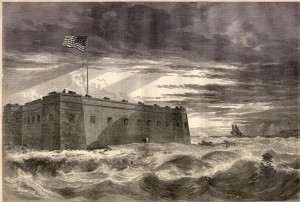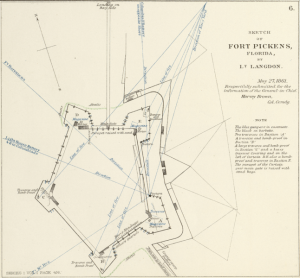March 1st – a day of lions and/or lambs. On March 1, 1861 The New-York Times editorialized about a different member of the animal kingdom:
SEEING THE ELEPHANT
— We have all our little troubles in this life, and for those who are not too proud, to use a popular phrase, it may be added that we have all our elephants to see. It is narrated of a certain farmer that his life’s desire was to behold this largest of quadrupeds, until the yearning became well nigh a mania. He finally met one of the largest size traveling in the van of a menagerie. His horse was frightened, his wagon smashed, his eggs and poultry ruined. But he rose from the wreck radiant and in triumph. “A fig for the damage,” quoth he, “for I have seen the elephant!”
A gallant fire-eater, now among the besiegers at Pensacola, appears to have his desire as yet ungratified. Somewhat apprehensive, yet “bound to see it out,” he writes:
“If Pickens opens fire upon us, with her tremendous batteries, we shall see the largest kind of an elephant.”
Let us trust that he may be disappointed. He wants, of course, to see the animal — to have his little experiences in war — to tell his story; — but it would be much better for him to try the experiment on a smaller scale at first. So with the gallant men of Charleston. The fact is, that the whole Secession party presents the spectacle of a body of impulsive gentlemen who are extremely desirous of seeing an elephant, and who, could they once feel him kick, or get a moderate toss from his trunk, would go home perfectly satisfied. Some of them have already had quite a satisfactory peep at the animal; others, in one form or the other, will undoubtedly soon get one. It is not positively an eternal Gun-Cotton-dom which they crave, but simply to see the elephant — to have a great time, and retire. Now that some of them have seceded, and done enough to talk about, let them come back. They have smashed their eggs quite sufficiently, and no one will deny them the glory of having seen the elephant.
1) WesClark has a history of the phrase “seeing the elephant” reproduced from Civil War Times Illustrated. California Gold Rush tells the story of the farmer who lost his goods in the wagon but saw the elephant. The Nebraska State Historical Society discusses the phrase in the context of the Gold Rush of 1849.
2) This editorial reminded me of a comment Allen from Seven Score and Ten made about a post on southern conditions and attitudes in the aftermath of Lincoln’s election. Allen said, “The illusory invincibility of youth is always a key factor in getting a war started.”
I guess the editorialist is assuming that many of the men who voluntarily joined the secessionists want to defend southern honor and get a little taste of battle and a taste of glory, but might not be ready for a long dragged out war. Apparently no one was – Lincoln’s initial request for militia was for 90 day sign ups.
Things obviously changed.
3) You can read more about Fort Pickens at Wikipedia:
Construction on Fort Pickens lasted from 1829 to 1834, with 21.5 million bricks being used to build the fort. Much of the construction was done by slave labor.



